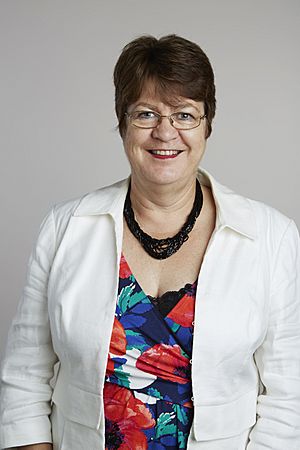Jane Clarke (scientist) facts for kids
Quick facts for kids
Jane Clarke
FRS FRSC FMedSci
|
|
|---|---|

Clarke in 2015
|
|
| Born |
Jane Morgan
10 September 1950 London, England
|
| Alma mater | |
| Spouse(s) |
Christopher Clarke
(m. 1973) |
| Awards | US Genomics Award (2010) |
| Scientific career | |
| Fields | |
| Institutions | |
| Thesis | Studies of Disulphide Mutants of Barnase (1993) |
| Doctoral advisor | Alan Fersht |
Jane Clarke (born in 1950) is a British scientist who studies biochemistry. She is also a professor of Molecular Biophysics at the University of Cambridge. Since October 2017, she has been the President of Wolfson College, Cambridge. In 2023, she became a member of the National Academy of Sciences in the United States.
Early Life and Education
Jane Morgan was born in London, England, on September 10, 1950. She went to the University of York and earned a top degree in biochemistry in 1972. After that, she studied at the University of Cambridge in 1973 to become a teacher.
From 1973 to 1986, Clarke worked as a science teacher in several high schools. She was even the Head of Science at Northumberland Park School in Tottenham.
In 1973, Jane married Christopher Clarke. They later had a son and a daughter. When her husband got a job in the United States, the family moved there. Jane could not teach in the U.S. because her qualifications were different. So, she decided to learn more about science.
In 1990, she earned a Master of Science degree in applied biology from the Georgia Institute of Technology. This experience made her want to work in protein research. She then returned to the University of Cambridge. In 1993, she earned her PhD for her studies on a protein called Barnase. Her supervisor was Alan Fersht.
Research and Career
Jane Clarke became a Wellcome Trust Senior Research Fellow in 2001. This means she received funding to do important research. In 2009, she became a Professor of Molecular Biophysics. She also became a Fellow at Trinity Hall, Cambridge, in 2010. On October 1, 2017, she became the President of Wolfson College, Cambridge.
Professor Clarke's research focuses on protein folding. This is how proteins, which are tiny machines in our bodies, get their correct shapes. Her work looks at:
- How proteins that are similar in structure fold.
- How proteins with many parts fold and sometimes misfold.
- The folding and assembly of proteins that don't have a fixed shape.
Her research has received money from important groups like the Wellcome Trust and the Medical Research Council.
She has written or helped write over 100 scientific papers. Some of her important papers include:
- A study in 2015 about how proteins interact very quickly.
- A 2011 paper showing how single molecules can reveal mistakes in protein folding.
- A 2008 review about using single-molecule studies to understand protein folding.
- A 2007 paper on how proteins with many parts fold and change over time.
Awards and Honours
In 2010, Professor Clarke received the US Genomics award from the Biophysical Society. This award recognized her important work in studying single molecules. She was the first person from outside the U.S. and the only woman at that time to receive this award.
She was also elected a Fellow of the Royal Society of Chemistry in 2015. In 2013, she became a Fellow of the Academy of Medical Sciences. These honors show that she is a highly respected scientist.
In 2015, she was elected a Fellow of the Royal Society. This is a very high honor for scientists in the UK. Her election recognized her deep understanding of how proteins fold and misfold. She discovered how different parts of proteins affect their folding. Her work has greatly changed how we understand proteins.
In 2021, she talked about her career on the BBC Radio 4 program The Life Scientific.
 | Jackie Robinson |
 | Jack Johnson |
 | Althea Gibson |
 | Arthur Ashe |
 | Muhammad Ali |

